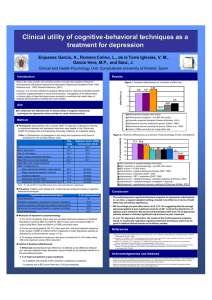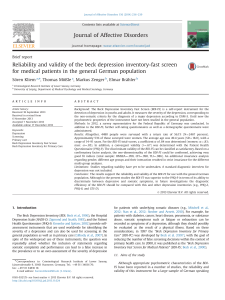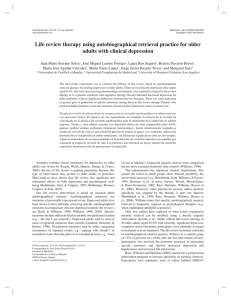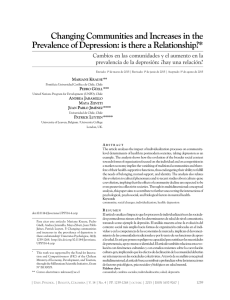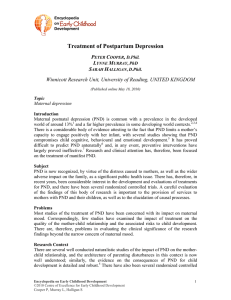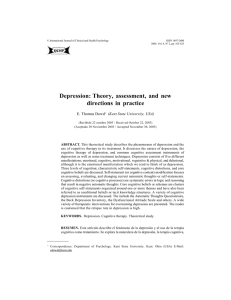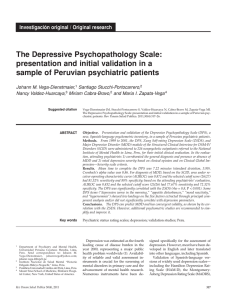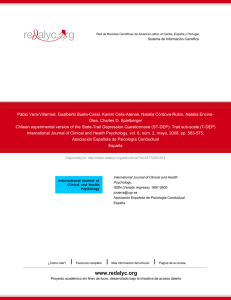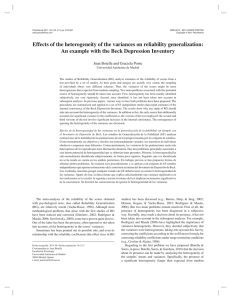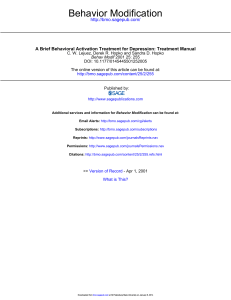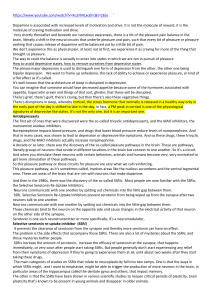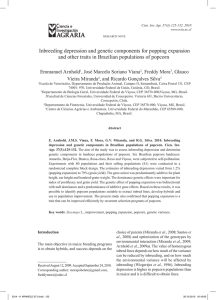DEPRESSION IN THE WORKPLACE
Anuncio
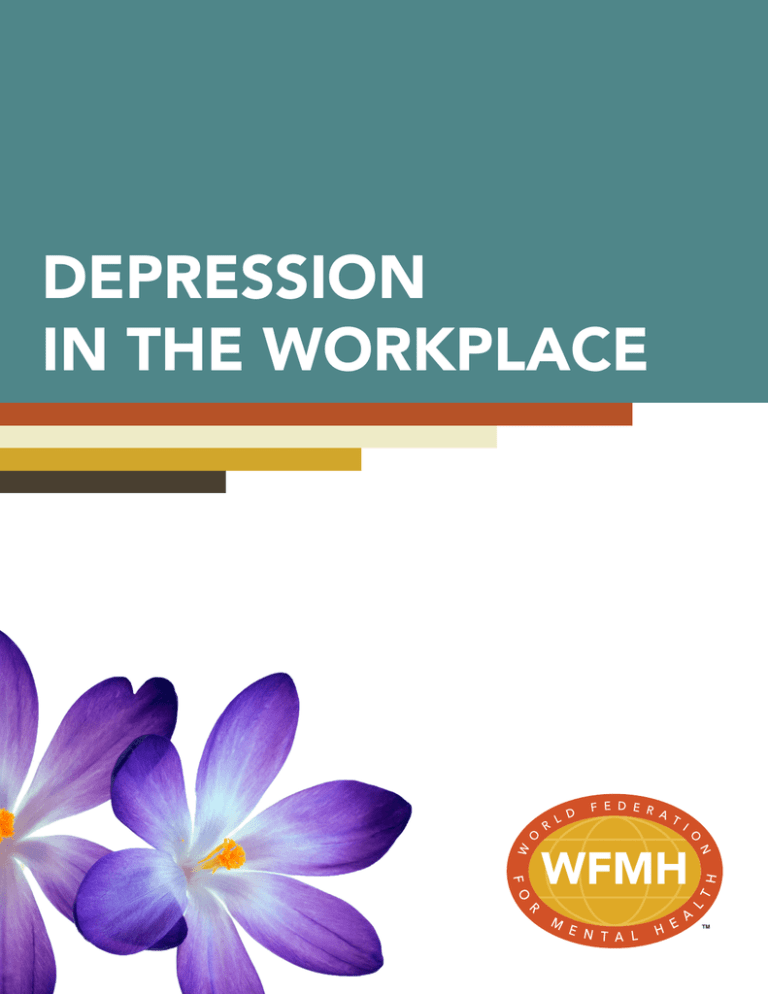
DEPRESSION IN THE WORKPLACE Burden and impact of depression Taking action against depression Depression is the leading cause of disability worldwide, affecting more than 350 million people.1 Depression is both common and serious, affecting different people in different ways.2 In addition to the commonly recognised symptom of low mood, less well understood are the cognitive symptoms of depression, e.g. lack of concentration, indecisiveness or forgetfulness, which are present up to 94% of the time during depressive episodes.3 Cognitive symptoms are associated with worse clinical and social outcomes in depression and affect many aspects of a patient’s life – leading to impaired work and social functioning.4 Even when remission is achieved, the chronic nature of depression means that symptoms, particularly cognitive symptoms, often persist.5 There are a number of actions that can be taken whether you are, inter alia, a politician, employer, or health care professional. The World Health Organization (WHO) has estimated that depression has a higher burden than lung, colorectal, breast and prostate cancers combined, and more than other psychiatric conditions such as bipolar disorder and schizophrenia.6,7 Depression has a corrosive effect on an individual’s ability to function at home, at work, and socially.8 Depression will impact an individual’s relationships with family, friends and colleagues, while time off work or reduced productivity at work can significantly affect the financial situation and push people into debt.9 Symptoms of depression also reduce the quality of life for an individual, while putting the person at increased risk of accidents and self-harm. Depression has significant socio economic costs. In 2010 it was estimated that depression cost the European economy 92 billion, of which approximately 54 billion (59%) related to indirect costs (such as absence from work).10 Although awareness of the problem of depression has improved, the stigma attached to it remains. A 2012 panEuropean survey by the European Depression Association (EDA) on the impact of depression in the workplace showed that only a third of workers with depression in Europe told anyone at work about it– and those that did were most likely to tell an immediate colleague.11 The predominant reasons employees gave for keeping silent were stigma and the fear of putting their job at risk.11 Further research from the London School of Economics (LSE) has emphasised that positive attitudes in relation to social acceptance of people with mental illness is a key factor in reducing stigma, and has shown a direct link between these attitudes and the experiences of people with mental illness.12 There is a general assumption that addressing mental diseases like depression is costly and requires highly specialised staff when in fact, simple and inexpensive initiatives can make a huge difference for patients, while reducing the burden and costs of depression on the economy.13 From an educational perspective, the non-specific nature of some depressive symptoms means that health professionals do not always attribute them to depression. The stigma of labelling someone as having a mental health condition such as depression also contributes to underdiagnosis.14 People lack understanding of the symptoms and experience of depression, tending to associate depression more with affective symptoms such as low mood, rather than cognitive symptoms such as difficulty concentrating, indecisiveness and forgetfulness.12 From a prevention and early intervention perspective, better detection, prevention, treatment and patient management are imperatives to reduce the burden of depression and its costs. As well as the indirect costs of reduced productivity, direct costs to health systems are also high. Costs comprising of outpatient care, drugs and hospitalization totaled $42 billion in Europe alone in 2006.15 Treatment of depression is more successful when the condition is diagnosed and treated early on so it is also important to identify people at risk by looking for the early signs of depression and for individuals under stress.16 It has been calculated that employers could save at least 30% of what they lose financially through lost productivity and the need to replace staff because of mental health conditions by taking simple steps to prevent and improve early identification of mental health problems in the workplace.16 From a treatment perspective, half of people with depression do not get access to treatment either because they are not aware of the symptoms or because they are afraid to seek help due to stigma. More than half of patients do not achieve adequate response following first antidepressant treatment and remission rates are progressively lower for each successive treatment step.11 Adequate treatment is a critical factor in reducing symptoms and improving employment prospects for people with depression.17 Patients suffering from depression who receive adequate treatment have a 76% remission rate.17 There is evidence that patients with depression who achieve remission function better and are less prone to relapse than those who achieve only partial improvement in symptoms.11 The provision of adequate treatment for depression allows patients to resume work 70 days earlier.17 The ultimate goal of treatment should be full functional recovery which appears to be largely driven by resolution of cognitive symptoms.18,19 Addressing depression also benefits businesses and studies have shown that treatment costs are outweighed by productivity benefits.20 From a legislative perspective, there is an increasing political call in Europe for the need to prioritise legislation that enables individuals with depression in the workplace to be identified sooner, and be encouraged to seek help.13 In Europe 43% of managers call for better policies and legislation to protect employees. Policies and legislation that have a clear potential impact on mental health in the workplace should contain specific measures to improve mental wellbeing, and at the minimum ensure the mental health of the workforce is not impaired.13 diagnosed with depression take time off work due to the illness - the average time lost is 36 days per episode.11,12 Employee’s absence due to depression is estimated to cost a business an extra 28% on top of the absent employee’s wage.16 From a workplace perspective, one in 10 managers in Europe confronted with an employee with depression admitted that they did not know how to react, while nearly one-third said they have no formal support or resources to deal with employees who have depression.11 Employers and human resources executives must play an informed leadership, facilitation, advisory and advocacy role to support employees with depression. The WHO goes on to suggest that the available literature on the impact of treatment for all forms of depression on worker productivity costs suggest that the gains made in reduced absenteeism and improved productivity at work may offset the treatment costs. Depression in the workplace Depression disproportionally affects adults of working age, meaning that it has a significant financial impact on businesses.6 A new study from the LSE and King’s College London has shown that depression costs employers £70 billion annually in lost productivity. Workers with mental health problems such as depression are absent from work for health reasons far more often than other workers, and when they have to take time off, they are away for longer.16,17 In Europe 20-55 per cent of employees The WHO in a recent update 22 reported that depression accounted for 2.5% of disability-adjusted life years (63.2 million DALYs) worldwide and 3.4% (8.4 million) in Europe alone. Workers with depression experience cognitive symptoms, such as trouble concentrating, indecisiveness or forgetfulness up to 94% of the time during an episode, reducing their level of performance in the workplace to below the standard expected.3,11 A large proportion of the workforce having suffered from depression associate it with concentration difficulties (57%), indecisiveness (44%) and forgetfulness (33%).11 Employees with depression report on average 5.6 hours per week of lost time, representing a serious erosion of productive capacity. Eighty-one per cent of lost productivity time (LPT) is due to reduced performance while on the job.21 United Kingdom estimates suggest that 1.5 times as much working time is lost through presenteeism as absenteeism for mental health conditions, and in the United States it has been suggested that it could be four times as much.16 Figure 6.15.1: DALY rate for Major Depressive Disease per 100,000 by gender and region 1681 DALY Rate per 100,000 1800 1600 1332 1400 1175 1156 1200 991 1000 800 805 699 682 600 400 200 0 Male Female World Male Female Central Europe Male Female Eastern Europe Male Female Western Europe Source: 2010 Global Burden of Disease Study. Seatlle, Washington Institute for Health Metrics and Evaluation, 2013. Support and resources References •One in 10 managers in Europe confronted with an employee with depression admitted that they did not know how to react, while nearly one-third said they have no formal support or resources to deal with employees who have depression.11 Research also shows that flexible working hours and time off is not necessarily the best strategy – especially in isolation – because it doesn’t promote the social inclusion a depressed person needs.12 A better option to tackle mental illness in the workplace is for managers to offer direct help to depressed employees. Equally, employers and human resources executives must play an informed leadership, facilitation, advisory and advocacy role to support employees with depression. 1 Depression Factsheet. WHO http://www.who.int/mediacentre/factsheets/fs369/en/. Last accessed March 2014. 2 Joska JA et al. Mood disorders. In: Hales R et al (eds). The American Psychiatric Publishing Textbook of Psychiatry. 5th Edition 2008. 3 Conradi HJ et al. Psychol Med 2011; 41: 1165-1174. 4 Withall A et al. Psychol Med 2009. 5 Conradi HJ et al. Depress Anxiety 2012; 29: 638-645. 6 World Health Organization. The global burden of disease. Available at: http://www. who.int/healthinfo/global_burden_disease/GBD_report_2004update_full.pdf. Last update 2004. 7 Ratnasingham S et al. Opening Eyes, Opening Minds: The Ontario Burden of Mental Illness and Addictions Report. An ICES/PHO Report. Available at: http://www. ices.on.ca/Publications/Atlases-and-Reports/2012/Opening-Eyes-Opening-Minds. Accessed March 2014. 8 European Depression Association. Impact and burden of depression. Available at: http://www.europeandepressionday.com/burden.html. Accessed March 2014. 9 Wilkerson B. BRAIN Health + BRAIN Skills = BRAIN Capital. Final Report of the Global Business and Economic Roundtable on Addiction and Mental Health. http:// www.mentalhealthroundtable.ca/mar_13/Dubai-Speech-Bill-Wilkerson-Mar-14-2013. pdf Solution • It is important to encourage all individuals to look after their mental health to prevent conditions such as depression, by providing information on managing stress and adopting a healthy work/life balance. • Target Depression in the Workplace [http://targetdepression.com] is a European initiative that aims to advise and support human resources professionals across Europe on the management of depression among their employees. The initiative brings together an advisory group of some of the largest businesses in Europe and international organisations working on health, labour and employment issues. –The group has recently released a report, “Depression in the Workplace in Europe: new insights from business leaders,” which provides insight into the burden, impact and challenges faced by companies. It also show-cases best practice from some companies in managing mental health issues in the workplace. Olesen J et al. Eur J Neurol 2012; 19: 155-162. 10 IDEA: Impact of Depression at Work in Europe Audit Final report. Ipsos Healthcare. October 2012. 11 Evans-Lacko S, Knapp M. Importance of Social and Cultural Factors for Attitudes, Disclosure and Time off Work for Depression: Findings from a Seven Country European Study on Depression in the Workplace. PLOS One. 2014 DOI: 10.1371/journal. pone.0091053 http://www.plosone.org/article/info%3Adoi%2F10.1371%2Fjournal. pone.0091053 12 Depression in the Workplace: Policy recommendations on how to tackle the leading cause of disability worldwide. Stephen Hughes MEP Initiative on Depression in the Workplace. 13 14 Oortwijn W et al. Social determinants state of the art reviews - Health of people of working age - Full Report. (2011) European Commission Directorate General for Health and Consumers. Luxembourg. ISBN 978-92-79-18526-7. Sobocki P et al. J Ment Health Policy Econ. 2006 Jun; 9(2):87-98. 15 Sainsbury Centre for Mental Health (2007). Mental Health at work: developing the business case. SCMH. 16 Sick on the job? Myths and Realities about Mental Health and Work. OECD, 2012. 17 Nierenberg AA, DeCecco LM. J Clin Psychiatry 2001; 62 (Suppl 16): 5-9. 18 Buist-Bouwman MA, et al. Acta Psychiatr Scand 2008; 118: 451- 458. 19 Simon GE et al. Journal of Occupational and Environmental Medicine. January 2001, 43 (1): 2-9. 20 21 Stewart WF et al. JAMA, 2003, 289 (23): 3135 – 3144. Priority Medicines for Europe and the World 2013 Update www.who.int/medicines/ areas/priority.../Ch6_15Depression.pdf 22 This report was made possible through a generous grant from Lundbeck.
